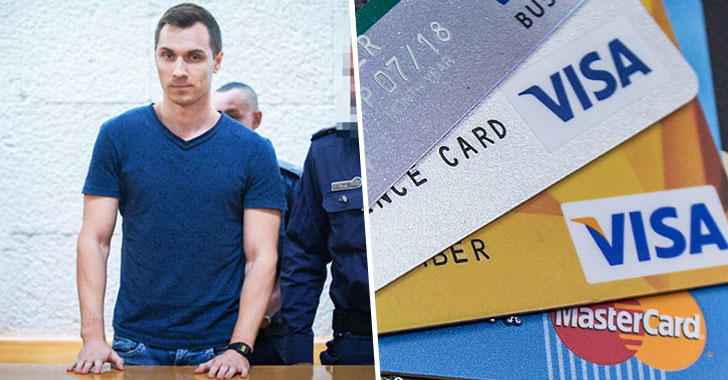A United States federal district court has finally sentenced a Russian hacker to nine years in federal prison after he pleaded guilty of running two illegal websites devoted to facilitating payment card fraud, computer hacking, and other crimes.
Aleksei Yurievich Burkov, 30, pleaded guilty in January this year to two of the five charges against him for credit card fraud—one count of access device fraud and one count of conspiracy to commit access device fraud, identity theft, computer intrusions, wire fraud, and money laundering.
Burkov admitted to operating a website named Cardplanet that was dedicated to buying and selling stolen credit card and debit card data for anywhere between $2.50 and $10 per payment card, depending on the card type, origin, and availability of card owner information.
According to the U.S. Department of Justice, Cardplanet hosted roughly 150,000 payment card details between 2009 and 2013, most of which belonged to U.S. citizens and used to make over $20 million in fraudulent purchases.
"Aleksei's massive fraud victimized hundreds of thousands of people and resulted in over $20 million in losses," said G. Zachary Terwilliger, U.S. Attorney for the Eastern District of Virginia.
"Tackling global cybercrime means holding accountable leaders like Burkov who have allowed cybercrime to become organized and hyper-specialized. I want to thank our prosecutors and investigative partners for their terrific work on this complex case."
In addition to Cardplanet, Burkov ran another invite-only forum website for elite cybercriminals where they advertised stolen personal identifying information (PII), malicious software, and other criminal services, like money laundering and hacking.
To become a member of Burkov's cybercrime forum, one needed to pay $5,000 as insurance and three existing members to vouch for their excellent reputation among cybercriminals.
According to the court documents, such measures were put in place to "keep law enforcement from accessing Burkov's cybercrime forum and to ensure that members of the forum honored any deals made while conducting business on the forum."
Burkov was arrested at Ben-Gurion Airport near Tel Aviv, Israel, in December 2015 and extradited to the U.S. in November 2019 after he lost his appeals against extradition in the Israeli Supreme Court and the Israeli High Court of Justice.
Before his extradition to the U.S., Russia also offered Israel a deal to release Burkov in exchange for freeing Israeli citizen Naama Issachar, imprisoned in Russia for drug offenses, but Israel refused to release Burkov and approved the U.S. extradition request.
Burkov had faced a maximum of 15 years in prison for the charges he admitted in January, but today the U.S. federal district court judge sentenced him to nine years in prison.
Aleksei Yurievich Burkov, 30, pleaded guilty in January this year to two of the five charges against him for credit card fraud—one count of access device fraud and one count of conspiracy to commit access device fraud, identity theft, computer intrusions, wire fraud, and money laundering.
Burkov admitted to operating a website named Cardplanet that was dedicated to buying and selling stolen credit card and debit card data for anywhere between $2.50 and $10 per payment card, depending on the card type, origin, and availability of card owner information.
According to the U.S. Department of Justice, Cardplanet hosted roughly 150,000 payment card details between 2009 and 2013, most of which belonged to U.S. citizens and used to make over $20 million in fraudulent purchases.
"Aleksei's massive fraud victimized hundreds of thousands of people and resulted in over $20 million in losses," said G. Zachary Terwilliger, U.S. Attorney for the Eastern District of Virginia.
"Tackling global cybercrime means holding accountable leaders like Burkov who have allowed cybercrime to become organized and hyper-specialized. I want to thank our prosecutors and investigative partners for their terrific work on this complex case."
In addition to Cardplanet, Burkov ran another invite-only forum website for elite cybercriminals where they advertised stolen personal identifying information (PII), malicious software, and other criminal services, like money laundering and hacking.
To become a member of Burkov's cybercrime forum, one needed to pay $5,000 as insurance and three existing members to vouch for their excellent reputation among cybercriminals.
According to the court documents, such measures were put in place to "keep law enforcement from accessing Burkov's cybercrime forum and to ensure that members of the forum honored any deals made while conducting business on the forum."
Burkov was arrested at Ben-Gurion Airport near Tel Aviv, Israel, in December 2015 and extradited to the U.S. in November 2019 after he lost his appeals against extradition in the Israeli Supreme Court and the Israeli High Court of Justice.
Before his extradition to the U.S., Russia also offered Israel a deal to release Burkov in exchange for freeing Israeli citizen Naama Issachar, imprisoned in Russia for drug offenses, but Israel refused to release Burkov and approved the U.S. extradition request.
Burkov had faced a maximum of 15 years in prison for the charges he admitted in January, but today the U.S. federal district court judge sentenced him to nine years in prison.
Found this article interesting? Follow us on Google News, Twitter and LinkedIn to read more exclusive content we post.




























